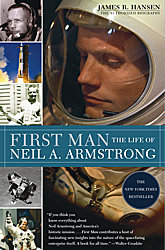Much to the chagrin of most Americans, the first man to set foot upon the moon has been fairly reclusive since that fateful day in 1969. He pops up from time to time, but not nearly frequently enough for the average celebrity watcher, and certainly not as often as the vast majority of his former astronaut colleagues. It is not the stated purpose of this book to explain (or excuse) that behavior, but it most certainly addresses the issue, in a very frank and candid manner.
Believing that the time had finally come, Neil Armstrong agreed to be interviewed (multiple times) by the author, and together with access to other NASA personnel, original documents, and the work of previous historians, this authorized biography came into being. It is darn near a work of art.
Tracing Armstrong’s roots all the way from medieval Scotland to rural Ohio, we learn about the semi-solitary nature of young Neil, who generally preferred to keep company with books rather than playmates. Not surprisingly, he was attracted to aviation as a teenager and loved mathematics. He was too young to enlist in the military for World War II, but the GI Bill from that conflict enabled him to go to college and eventually set him on the path to become a test pilot and, subsequently, an astronaut.
He was directly involved in the Gemini and Apollo programs, and the sections detailing that era are absolutely riveting. There is a lot of necessary technological verbiage to wade through, but the author does quite a good job of making it as painless as possible. The true gold here lies within the interpersonal relationships between the astronauts, their leaders, and their families. For the first time, these men and women are portrayed as human beings, not heroes, which is exactly how it should be. The reader feels as if he is actually coming to know these individuals and understand their motivations and their sacrifices.
Not surprisingly, the post-NASA portion of Armstrong’s life is concentrated into a short portion, but it does not disappoint. The topic of his separation from celebrity is approached from numerous angles (not all of them apologetically), and the reader is left with an honest understanding of the man’s choices. Over the course of the 648 pages, we get to know a person who has had the fortune to do great things and has done his best to maintain his sanity and his integrity afterwards.
Rated: Moderate. There are no uses of strong profanity, but there are just over forty uses of standard swear words, and about a dozen vain uses of the Lord’s name. No intimate descriptions at all.




